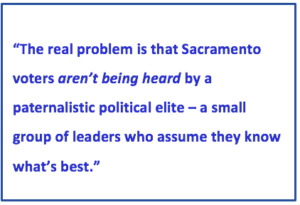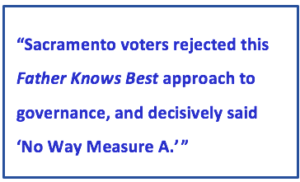Dan Walters November 9 column in the Sacramento Bee recycled timeworn arguments in defense of Measure A, the City of Sacramento’s “strong mayor” proposal defeated on November 3.
Sacramento, he wrote, is like a “gangly adolescent” not “willing to grow up,” not mature enough to adopt “a big city governance structure.”
Really? I see it differently: One of the state’s most politically sophisticated communities – more policy wonks per precinct than most municipalities – resoundingly rejected a flawed proposal that doesn’t fit t heir values and vision for Sacramento.
heir values and vision for Sacramento.
It’s not that Sacramentans don’t “get it,” that they’re not able to understand what civic sophistication really means.
Quite the opposite. The real problem is that Sacramento voters aren’t being heard by a paternalistic political elite – a small group of leaders who assume they know what’s best.
The “strong mayor” proposal was poorly timed and marketed with brash manipulation.
For many of us involved in City politics (but not part of the Mayor’s inner circle), Measure A came out of nowhere, and was strong-armed through City Council in a matter of weeks.
There were no neighborhood-based, public hearings and scant opportunity to vet a complicated proposal that would have fundamentally restructured city government.
At the two Council meetings where Measure A was deliberated, dozens of community leaders implored Councilmembers not to push forward with a city charter amendment right before “the election of our lifetimes” and in the middle of a pandemic, when people are struggling to find or keep jobs, pay rent, and quite literally, stay alive.
The appeals made no difference: Business support was already lined up, and Mayor Steinberg, Measure A’s most visible advocate, moved ahead and spent over a million dollars to promote Measure A.
You read that right: over a million dollars.
Proponents went on to highlight Measure A’s “equity proposals,” entirely decorative enticements intended to persuade people of color and women that the measure merited progressive support.
Equity advocates weren’t convinced. They knew a charter amendment wasn’t necessary to implement many of the equity proposals. It takes only a vote of the Council, for example, to require the city’s budget to analyze “social equity impacts” or dedicate $40 million for “inclusive economic development and youth services.”
Moreover, many advocates who lobby City Hall on racial and gender justice issues (including leaders from the local NAACP, the League of Women Voters, the Measure U Committee and the Sacramento Women & Girls Advancement Coalition) weren’t consulted when Measure A’s equity proposals were drafted.
Which didn’t exactly communicate respect – and solidified suspicions that the equity proposals were added as window-dressing to attract votes.
Let’s call this “political paternalism” – when an elected official assumes they know what’s best for a community – without soliciting input from leaders outside their inner circle.
Sacramento voters rejected this Father Knows Best approach to governance, and decisively said “No Way Measure A.”
Not because they’re immature, gangly adolescents. Rather, voters legitimately fear the potential for long-term damage to city finances, staffing, neighborhoods and reputation should a too-strong mayor be incompetent, corrupt or cavalier.
Measure A’s defeat not only sends a message about the voters’ preferred governance structure, but also their expectations for governing style: No more political paternalism.
It’s time for the Mayor and City Council to truly listen to people outside their inner circles – and offer up the strong and collaborative leadership we need to address our big city problems.
